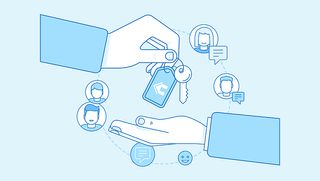A change in ownership: how resellers can benefit from the circular economy
Reduce, reuse, recycle isn't just the mantra of the environmentally aware — it's for the channel too

According to the United Nations University (UNU), we disposed of 42 million tonnes of electronic waste globally in 2014, with a total value of €48 billion - yet only 15% of this was collected and treated.
In the traditional linear economy, products are made, used and then disposed of, representing a tremendous loss of value. The concept of a 'circular economy' is challenging this conventional approach. It advocates a system that seeks to eliminate waste by promoting superior product design, maintenance, reuse, refurbishing and recycling. Leasing is well positioned to support the 'circular economy' as the leasing company retains ownership of an asset throughout its lifecycle. At the end of the asset's economic life, the leasing company recovers the unit for remanufacturing, maximising its economic utility and minimising its environmental impact.
The ICT channel can play an active role in the 'circular economy' and help reduce the huge amount of electronic waste produced each year. Rather than sell ICT equipment for cash, resellers can consider integrating a lease option into the sales process. Should the customer agree to lease the equipment, the asset(s) are returned after two, three or four years for remanufacture and reuse.
Leasing penetration is traditionally low within the ICT industry. Aside from helping customers access new technology and avoid obsolescence, leasing is key to building a sustainable circular economy -- and maintaining a competitive advantage in a changing market.
Changing habits
There's a growing appetite for access over ownership and leasing is on the rise globally, particularly in the technology channel. According to the results of BNP Paribas Leasing Solutions' 2017 Global Leasing Report, the UK leasing industry captured $87.13 billion in new business volume in 2015, growing 14% compared with the previous year. The largest rate of growth came from the ICT equipment market, which grew by 38%. This represents an opportunity for the channel to deliver greater value to customers, as well as become more sustainable.
The business benefits of the circular economy for IT resellers
Forge stronger relationships with your customers
Successful businesses are built on strong, loyal customer relationships. Leasing ICT hardware helps resellers forge a long-term, trusted partnership. When a customer buys a desktop computer or ICT solution outright, it's a one-off deal that presents little chance to develop the relationship further. A leasing contract keeps the customer close as, once the equipment reaches its end of life or the contract expires, they will come back to the reseller for an upgrade or renewal. Additional services and products can also be added midway through the lease term to scale with the customer's growth trajectory, which opens a new revenue opportunity for the reseller.
Channel Pro Newsletter
Stay up to date with the latest Channel industry news and analysis with our twice-weekly newsletter
Support your customers' cash flow
The customer benefits from a low barrier to entry. Limited cash flow may prohibit the outright purchase of new IT equipment but a monthly payment is far more affordable and enables them to access the assets they need. A leasing agreement also means that customers don't need to worry about managing their ICT assets' end of life phase -- which can be costly.
Be environmentally aware
The circular economy speaks to a growing trend of environmental awareness. As resources become increasingly scarce or under threat, it's important that businesses reduce waste and maximise productivity from existing materials. The environment cannot sustain humankind's current levels of consumption. However, the moral argument is often not immediately as persuasive as a strong business case. Fortunately, the circular economy delivers both.
Shift in ownership
The circular economy prompts manufacturers to develop green assets through a sustainability argument. When customers lease a product instead of purchasing it, the finance provider is still responsible for the product after the initial lease term. With sustainability built into product design, the leasing company is better placed to influence the remanufacture and reuse the asset in a secondary or even tertiary life. This shift in product design and usage model ensures fewer raw materials are required to manufacture and meet the insatiable demand for technology.
Ultimately, the circular economy could create an ecosystem in which the most environmentally sustainable products are also the most economical. In time, this would also produce a more predictable, profitable and ethical business for resellers.
Jean-Michel Boyer is CEO of BNP Paribas Leasing Solutions UK




